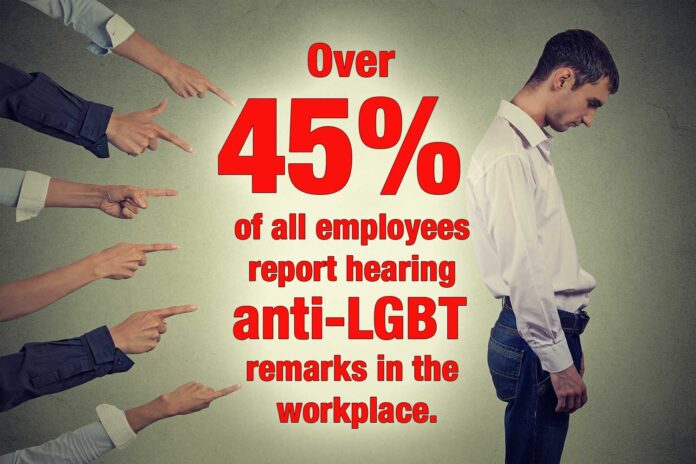A recent study from the Williams Institute revealed something you probably already know: discrimination against LGBT people is rampant in many workplaces. It’s so rampant that the study found nearly half (45%) of all employees witnessed anti-LGBT harassment in their workplace. Whether it’s a discriminatory comment, unequal treatment, or a direct confrontation, anti-LGBT harassment in the workplace is something that many in our community have always had to live with.
Almost every week in PGN, we report news stories on LGBT people who have been fired from their jobs due to alleged discrimination. In fact, we’ve been reporting these stories weekly since 1976; they’ve been a constant, sad reminder that even though progress has been made for some, many others still face discrimination because of who they are.
The news stories make it plainly obvious that LGBT discrmination in the workplace has unfortunately endured. But there’s another article that PGN does every week that also shows bigotry’s unfortunate effects, and it’s probably not the article you’d expect: Family Portrait.
Each week, Suzi Nash does a beautiful job at showcasing members of our LGBT community, and the stories of perseverance, optimism, hope and love are one of the staples of the paper. But the Family Portrait articles also show, in our digital, search-results driven age, that workplace discrimination against LGBT people is alive and well.
Every couple months, we’ll receive messages from people who have been featured in Family Portrait in the past but now want us to take down their article. At the time, they were interviewed by Suzi Nash, had a wonderful time, and were happy to be featured in PGN. But two, three, five years later, they’re looking for a job and they don’t want their prospective employer to see them in an LGBT newspaper. Sometimes the Family Portrait article is one of the first things to come up in search results.
Most often, the people who request their article be taken down have moved to rural areas in conservative states or countries. But it’s not every time. Sometimes it’s just a person who is navigating the corporate world in a big city. In both instances, the people are afraid that a prospective employer will deny them a job opportunity or their current employer will treat them differently if they find out they’re part of the LGBT community.
It’s a sad reminder that LGBT discrimination exists not just in rural conservative areas, but in many urban areas as well. Geography and industry both play a role in how much discrimination an LGBT person could face in the workplace. It’s still not safe for many people to be out at work. Even with nondiscrimination laws in many parts of the country, there is still a risk for people to let their coworkers or bosses know they are LGBT. And that is a true shame.

